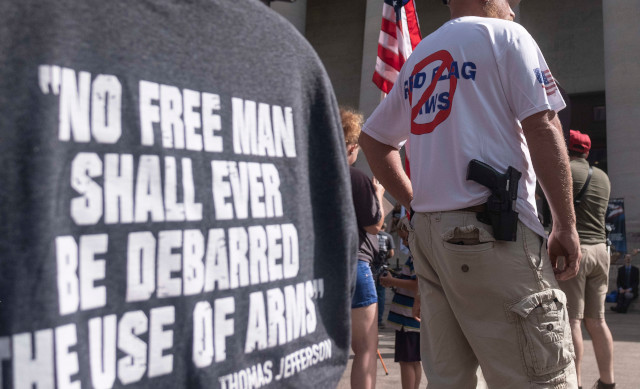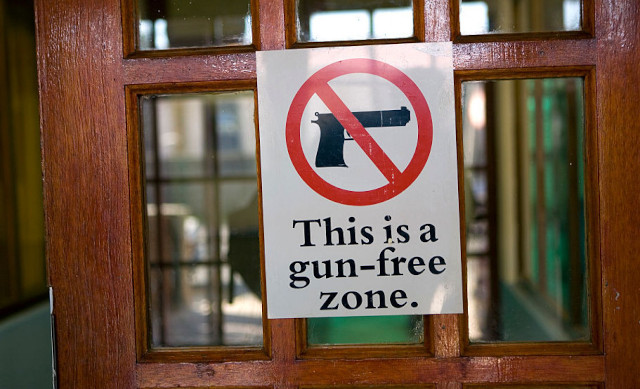By Marvin Marroquin • Updated: 02/12/2023 • 7 min read
The federal government guarantees the right to bear arms under our nation’s Constitution. On the other hand, individual states have several different gun control laws. Should states limit the right to bear arms?
States should be able to limit the right to bear arms. However, regulations should be weighed against whether law abiding citizens are unjustly burdened to comply. With all the variations of the law, there also needs to be consistency across the board.
There’s no question every state should be able to create laws and policies that are unique to its own needs. However, when it comes to the fundamental Constitutional rights of the individual, it requires consistency across all states. Our unalienable rights should not change depending on where our feet are geographically planted.
Why states are allowed to limit rights
This topic is a very complex area of law, but to put it simply, states may absolutely choose to restrict a constitutionally protected right. However, in order to do so the state must demonstrate it has a “compelling state interest” which it seeks to protect. We see this in the case of protecting children from exploitation and how it outweighs the constitutionally protected right of freedom of speech. Thus, there are laws against child pornography.
Likewise, with the Second Amendment, we see similar restrictions based on compelling state interest. A great example would be prohibiting a violent convicted felon from owning and carrying a gun. To a reasonable person, these examples of limitations to constitutional rights would not be questioned. Of course we don’t want children exploited. Of course we don’t want violent criminals to possess firearms. The burden to comply with these limitations falls on the law breaker.

So, what happens when these limitations create a burden for good, law abiding Americans? For example, New York has enacted a limitation on magazine capacity, no more than 6 rounds for pistols. Where do you think the burden to comply falls? Of course, the law breakers will simply ignore it leaving the law abiders to be outgunned for complying. Any limitation must be determined by whether or not it creates an unjust burden to good, law abiding citizens.
Another reason why states are allowed to limit rights is to maintain its sovereignty over the federal government. Remember, the colonies just broke free from the tyrannical centralized government in the United Kingdom. Also, many people forget the colonies experimented with the Articles of Confederation, which gave all powers to the states and left virtually nothing to the national government. Eventually, they determined that a strong central, but limited, government was necessary while also being able to check rogue states.
Limiting rights causes confusion
When individual states are allowed to limit the right to bear arms as they see fit, naturally there will be variations based on different interpretations. In fact, we see how much confusion there is surrounding the issue of simply traveling with a gun. At times, it’s bad enough trying to fully understand the laws of your home state in order to comply. Traveling to a different state requires you to comply to a different set of rules. Gun owners make the claim that a constitutional right should be consistent across all states, much like how the right to vote or the right to petition the government is treated.
No other constitutional right is treated with such subjective application like the Second Amendment is. If you have a permit to carry a concealed weapon in Pennsylvania and then travel east into New Jersey you’d be in trouble. It’s like your rights have been spontaneously sucked into a black hole once you’ve crossed state lines. Why aren’t concealed carry permits treated like a driver’s license? After all, driving is a privilege, not a right. Yet a driver’s license in one state is valid across the entire country.
It’s very confusing for gun owners to fully understand all the nuances of every states’ laws regarding gun ownership. Some states are overwhelmingly strict and some are very lax. Some states have variations of the law among their own cities. This lack of consistency causes so much confusion. No one should be expected to be well versed in 51 variations of the same right.
Limiting rights causes conflicting laws
Earlier, I gave an example about the confusion of carrying a concealed weapon from Pennsylvania into New Jersey can cause. For Shaneen Allen, a Pennsylvania resident and licensed concealed carry permit holder, this was her reality. She was pulled over in New Jersey during a routine traffic stop and was arrested after informing the officer about her pistol and license to carry. Imagine her surprise when she was told her permit was not valid in New Jersey. If it weren’t for Gov. Christie’s pardon, she’d have to spend 3 years in jail for being ignorant of another state’s law.

This is the problem with variations of the law regarding the same constitutional right. The rights we have as individuals should be exercised freely across every state. Take your pick at any other constitutional right we have in this country. They are all applied the same way in every state. The right to bear arms is the only one treated differently across the country.
Let’s look at several examples of conflicting laws. Kansas is a constitutional carry state, which means you don’t need a permit to open or conceal carry a gun. You may travel south into Oklahoma and also carry concealed without a permit. However, traveling further south you’ll need a Kansas concealed carry permit to simply carry your gun in Texas.
Another example is the “Duty To Retreat” (DTR) laws that some states have. This law requires you to retreat if you’re able to avoid serious injury or death before deciding to use deadly force. It’s incredibly difficult to prove your inability to retreat after the fact. Some states will allow you to “Stand Your Ground” (SYG) and use deadly force if you reasonably believe your life is in danger, without even considering to retreat. Imagine visiting a DTR state while traveling from a SYG state. These variations of the law could be the difference between self defense and murder.
How should states determine limitations?
If states are going to place limitations on constitutional rights, especially one that can protect a life, we need to make sure certain criteria are met. Let’s use “do not murder” as an example. No one would argue this is a bad law. It protects the right to life of people, whether good or bad, no one deserves to be murdered. It also targets the law breakers in society. Law abiding citizens aren’t the ones waking up in the morning thinking about murder, the burden to comply only falls on the evil people.

In other words, the law must have reasonable expectations. We’ve seen how unreasonable it is to expect criminals to comply with things like magazine capacity limits, gun bans, gun free zones, etc. They have demonstrated time and time again that nothing will stop them from committing a crime. These limitations are putting the good guys at an unjust, and extremely dangerous, disadvantage.
As long as these states continue to enact unreasonable and inconsistent laws, we’ll always have roadblocks trying to pass laws that actually help people. The Concealed Carry Reciprocity Act of 2017, which already passed in the House, will allow gun owners to carry a concealed weapon anywhere in the U.S. with a valid permit from their home state. This would eliminate much of the confusion between different laws among states.
